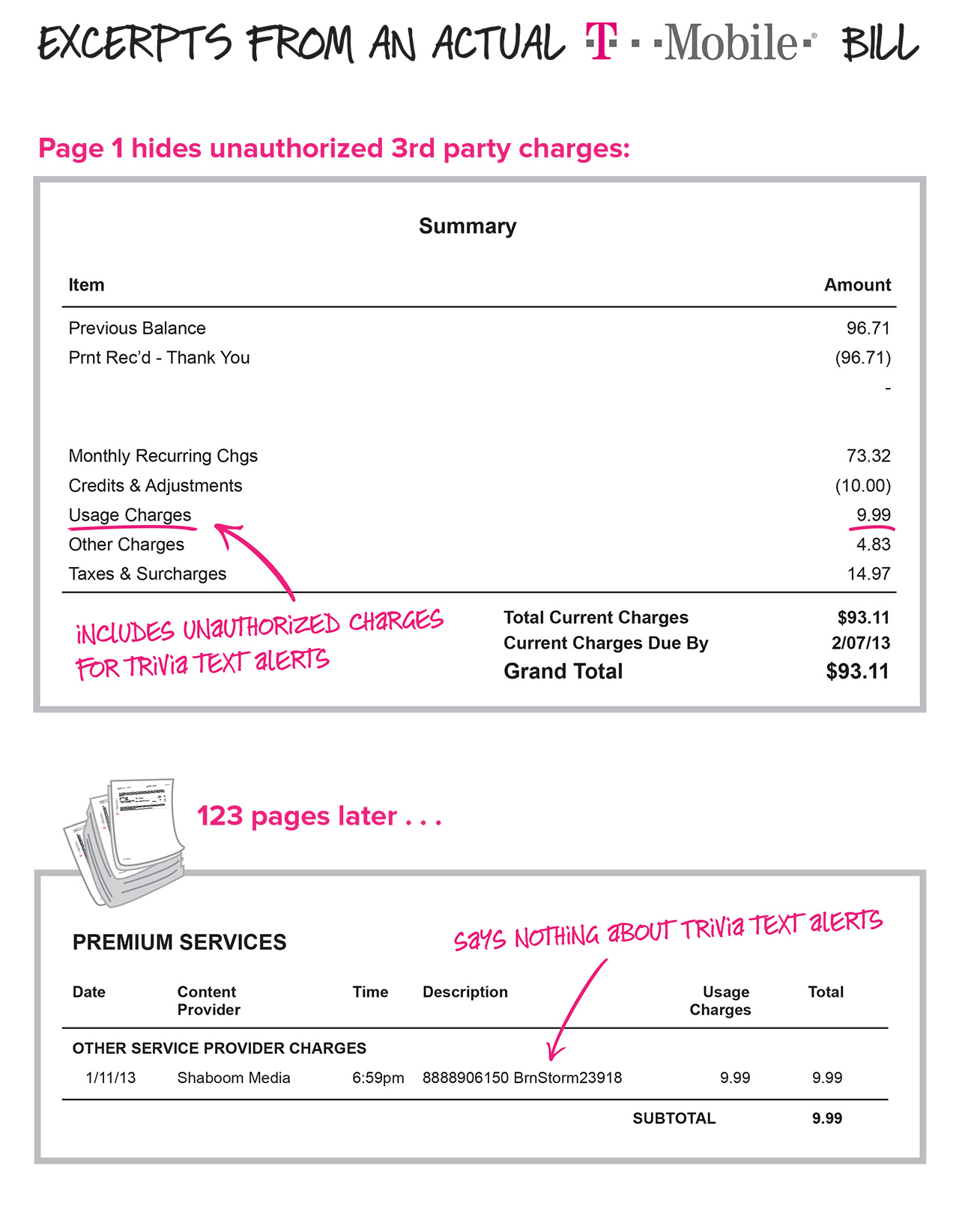Not just T-Mobile: how bogus charges get on your bill
Share Now on:
Not just T-Mobile: how bogus charges get on your bill
The FTC says T- Mobile made hundreds of millions of dollars from bogus charges on consumers phone bills. The charges were from third parties, but T-Mobile’s cut was allegedly as much as 40 percent.
“These were charges for things like flirting tips, dating tips, horoscopes, and other things that the consumer didn’t want,” says FTC attorney Malini Mithal. “This is a practice called mobile cramming.”
And it’s not something that T-Mobile invented. “It’s been going on for years—decades even,” says David Butler, a spokesman for Consumers Union. “Long before the popularity of wireless phones, landline phone users were getting hit by cramming charges.”
A Senate Commerce Committee investigation from 2011 estimated the costs to consumers across the industry in the billions. The committee report details just how consumers end up getting stuck with these charges:
1. 100 Percent, straight-up scamming. Billers just submit customer phone numbers to telecoms.
That includes unpublished numbers that nobody actually uses for phone calls.
“Numerous businesses and government agencies told Committee staff they have incurred crammed charges on telephone lines that are dedicated to alarm systems, elevators, modems, and other lines that are not assigned to any employees,” says the report. Many of the numbers were completely unpublished. A fax line got billed for music downloads. An ATM line got billed for “Internet services.”
A man in Connecticut fought charges from “Talent & More,” which was charging his mother-in-law for hosting an online profile marketed to casting agents. “My mother-in-law us 82 years old, does not have internet access, and would not know how to use a website,” he wrote to the state attorney general.
2. Dummy calls to get bogus “authorization”
Business owners told the Senate committee staff that when they tried to fight bogus charges, they were told there was a recording of them giving authorization. The committee got some of those recordings, which “show telemarkets quickly reading through long scripts, while employees answer ‘yes’ or ‘okay’ to questions they clearly do not understand.”
3. Soliciting business via text… and not taking “no” for an answer
One company allegedly sent text messages offering horoscopes, dating tips and other services, and (according to the complaint in a class-action lawsuit) started charging people even if they replied “STOP” or called to say they didn’t want the service.
4. With telecoms generally turning a blind eye — and sharing the profits
The Senate committee estimated that phone companies, which take a cut from third-party transactions, made more than a billion dollars from the practice over a ten-year period, and found that telecom companies did little to help their customers fight charges, or to check out companies that were obvious scammers.
Which is pretty much what the FTC is charging in T-Mobile’s case. The FTC says the company ignored signs that charges were bogus. And that the company buried those charges deep inside phone bills.
For its part, T-Mobile doesn’t dispute that stuff like this happened. But the company says it stopped billing for these services in late 2013.
For further reading: Our friends at Ars Technica have been covering the cramming story for years, starting with an account by editor Nate Anderson of his own experience getting crammed in 2008.
Here’s an example the FTC says comes from a T-Mobile bill:

There’s a lot happening in the world. Through it all, Marketplace is here for you.
You rely on Marketplace to break down the world’s events and tell you how it affects you in a fact-based, approachable way. We rely on your financial support to keep making that possible.
Your donation today powers the independent journalism that you rely on. For just $5/month, you can help sustain Marketplace so we can keep reporting on the things that matter to you.


















